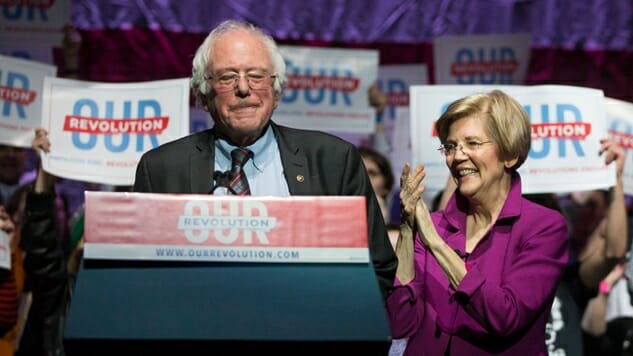What’s the Difference Between a Liberal and a Progressive?
Photo by Scott Eisen/Getty
In a word, economics*.
*Anti-imperialism is a central tenet of socialism, and foreign policy is a major arena where leftists and liberals differ, but I’m going to ignore this complex topic for the purposes of this explainer, since economics is a more broadly understandable fault line.
In more than a word, you first need to understand the major event that shaped the politics of the largest generation in history in order to understand the rise of progressivism from that generation. I can’t help but chuckle at (tongue-in-cheek?) headlines like this, given well-known facts like how millennials largely prefer socialism to capitalism.
On the cover of @nymag: When did everyone become a socialist? https://t.co/h4YaRWGLuEpic.twitter.com/oPkugfpFl4
— NYMag Communications (@nymagPR) March 4, 2019
To answer New York Mag’s question in a word: 2008.
Millennials were saddled with debt and then thrust into an economy losing 800,000 jobs a month when President Obama took office in 2009. I graduated college that year and it was immediately apparent that everything I had just learned about how the economy was “supposed” to work was one big lie. Banks foreclosed on millions of homeowners thanks to complex financial instruments centered on bad loans peddled by Wall Street (who paid off regulators to rate these crap securities as AAA, as revealed in the must-read book about the 2008 crisis, All the Devils Are Here)—if that wasn’t enough, then we learned that these banks didn’t even own a bunch of mortgages that they foreclosed on.
That’s pure evil.
While the rest of us got little to no help from the government, Bank of America got bailed out in the form of gaining the 3rd largest investment bank, Merrill Lynch, who the government forced a sale to Bank of America to thanks to all the gambling that Merrill Lynch did with these subprime housing securities. Lehman Brothers used to be the 4th largest and the oldest investment bank on Wall Street before they were vaporized by the subprime crisis in a week. Everything went to hell and no one knew what to do. Fiat money revealed itself to be the magic trick it always was, and an entire generation up to their eyelids in student debt—forced upon them as a requirement to join the economy—joined an economy in complete collapse.
You say capitalism is an inherently efficient, just and moral economic system?
Most millennials say:
Fun fact: the subprime auto loan market is just beginning to crumble, and capitalism has taught us that recessions come every ten years or so, sooooo…
The reason why socialism is popular among millennials is because we were introduced to capitalism while its pants were down. There is no hiding what we saw in 2008, and it’s quite telling that the biggest economic collapse in most people’s lives has largely receded from the mainstream discussion as millennials have moved further and further left, while endless “how did socialism happen?” headlines get pumped out from establishment media outlets.
Given how little political ideology factors into our mainstream political media’s coverage of America, it’s understandable to be a bit confused by these two seemingly interchangeable terms describing liberalism. Yet they are very much not interchangeable. Here is a quick guide from a millennial who studied this stuff as a political science major in college as to what substantively distinguishes a “progressive” from a “liberal.”
Are You A Liberal?
Bringing this back to the first sentence: economics is a central fault line in the difference between being a liberal and being a progressive. If you believe in capitalism—not in the American propaganda nonsense that it’s freedom and bald eagles and blah, blah, blah—but definitionally, in the sense that you believe the greatest economic value to the populace can be gained from an economy based around private entities owning the means of production (what we call a business) for the express purpose of profit. That bolded part is vitally important. Once you start retreating from endorsing the perpetual chase for profits, at a certain point, you retreat into a different political ideology (if you’re wondering what specific point that crossover happens, I’d recommend consulting an expert who studied this topic for more than four alcohol-infused years in college).
A key tenet of classical liberalism is that it endorses the capitalist notion that profit equals value creation, since it makes the correct assertion that profit must have value since it is literally creating something from nothing. The degree to which profit motives should be maximized is a central debate in liberal thought, but the fundamental notion that businesses exist in order to create profit is widely agreed upon amongst liberalism. This is why Elizabeth Warren falls under the traditional “liberal” definition more than “progressive,” because many of her excellent policies have the word “access to” embedded within them (“access to” = market-based solution).
Warren’s fantastic idea to require workers to represent 40% of all boards is a good elevator pitch for her kind of liberalism: capitalism can work when worker power is written into the social contract, but at 40%, capital ultimately still runs the show. The last generation of “liberals” have pushed Democratic Party policy so far to the right of that notion, that on a comparative basis, Warren’s platform feels indistinguishable from a fundamentally different one than hers: the one that belongs to Bernie Sanders.
Are You A Progressive?
Being dissatisfied with the current economic status quo doesn’t make you a progressive. America is a capitalist nation, but the capitalism we have experienced from 1980 to today is different from the capitalism America experienced from 1950 to 1980, etc…what makes you a progressive is essentially being opposed to the central tenets of capitalism, and challenging the assertion that the best way to create maximum economic value is to maximize profits. This is the story of my migration from a capitalist to democratic socialist mindset. I started by changing my mind on socialized medicine (which comprises about 20% of the economy) and checked off enough major industries (energy, housing, food) that I don’t believe should be based around a capitalist profit motive that I couldn’t credibly call myself a capitalist anymore.
I have always believed in the power of a local/decentralized economy where small businesses can thrive (emphasizing “decentralized” in their vision is ultimately why I joined the Democratic Socialists of America), but as far as the gargantuan tasks of feeding, housing and staving off certain planetary devastation for its citizens goes, I don’t think that private companies should take the lead in those arenas. I believe that those are basic rights the government should guarantee, and I believe that you can still build a supplemental market on top of it, given that market forces will forever exist independently of economic ideology (“market forces” is the opaque name we’ve given to the basic dynamic of humans living off our respective talents through the laws of supply and demand).
Believing that the government should take the lead over private industry in lots of major areas makes me a progressive. Not too long ago, I believed the private market should take the lead in these major industries, and that made me a liberal. Bernie Sanders is proposing a New Deal-style change to the economy, where workers have a whole lot more control than just 40% of boardrooms. It is not a purely capitalist vision for the economy, and that is what makes it progressive.
Why This Matters
Given that we have the most important election in U.S. history upcoming next year, it’s vitally important that we all understand the terminology that we’re using to describe how we will fix our massive problems. Kamala Harris has branded herself as a “Progressive Prosecutor,” which is just provably false, given that we finally have actual examples of progressive DA’s in major cities like Larry Krasner in Philadelphia or Marilyn Mosby in Baltimore. Harris’s record on criminal justice is far more complex than the “Kamala is a cop” meme suggests, but it sure as hell is not progressive.
Had Harris called herself a “Progressive and a Prosecutor,” she’d be dealing with far less noise since she actually does have a legitimately progressive Senate record that she could tout (she’s one of the only Democrats who can say she got something big done under Trump with her criminal justice reform). Given that Kamala is clearly a front-line contender and Bernie has a massive name recognition advantage over everyone not named Joe Biden this time around, the “progressive versus liberal” discussion is sure to be a central feature of the 2020 Democratic primary (“progressive versus liberal” could also be the name of the story of Senator Harris and “Progressive Prosecutor” Harris).
Liberals are not progressives, and backing fundamentally progressive policies like Medicare for All and the Green New Deal flies in the face of liberal economic orthodoxy. These are not proposals to enhance the market. They are proposals to lay waste to the inefficient profit-driven markets literally killing us, and replace them with a government-run alternative. That’s not to say you cannot be a liberal and want progressive legislation—the desperation of our situation with climate change makes our ideological squabbles seem trivial—but if you think you are a liberal and you find yourself endorsing progressive policy, ask yourself what kind of economy you really want.
Are you happy with the model of private companies running the show for the express purpose of profit, or do you think that a government program(s) could improve the economic value provided by industries like health care that are going to exist regardless of what economic ideology is in place?
Private versus public governance of major industries is one of the fundamental dividing lines here. You’re either with capitalism or you aren’t. This really is something of a binary choice given the constraints of the ideological frameworks of liberalism and progressivism. It is simply not possible for both single payer healthcare and Cigna to exist.
No one ideology has a monopoly on good ideas, as demonstrated by Salt Lake City Republicans agreeing with English socialists on the simple solution of housing the homeless, but we have plenty of evidence over the last forty years of conservative and “liberal” rule of what doesn’t work. If presidential candidates are going to back policies like the Green New Deal and Medicare for All while claiming that they are fundamentally liberal, not progressive, ideas, then they either do not understand the ideological distinctions in this debate, or more cynically—they do—and they are trying to co-opt the popular rise of progressivism on the left in order to pass something more market-friendly under the names popularized by government interventionists. Progressive ideas are very popular in America, while the terminology to define those ideas (like socialism) is less so (this is the legacy of McCarthyism). If you’re ever confused as to whether you’re a liberal or progressive, just ask yourself whether you feel more comfortable with private profits dictating major industries like health care, or if you would prefer the government to handle it so there is no focus on maximizing profits.
Jacob Weindling is a staff writer for Paste politics. Follow him on Twitter at @Jakeweindling.







































